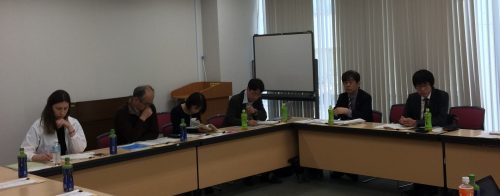The discussion session was attended by 11 representatives, an invitee from MEXT (Ministry of Education, Culture, Sports, Science and Technology) and 10 staff and faculties from 6 Japanese universities which had experiences or interests in exchanges between Japan and Russia especially regarding city development.
Participating Universities:
University of Tsukuba (Industry-Academia Collaborative Exchange in Architecture)
The University of Tokyo (Civil Engineering)
Nagaoka University of Technology (Highway Engineering)
Niigata University (Architecture, Civil Engineering)
Osaka University (Interdisciplinary Internship)
Hokkaido University (Architecture for Cold Regions)
The session started with opening speeches given by each staff from Hokkaido University and Niigata University. Both universities were jointly adopted for the Type B Platform-Building Project of the 2017 Inter-University Exchange Project (for Support for the Formation of Collaborative Programs with Russian Universities). After those speeches, one more opening speech was given by participant from MEXT.
At the session, Professor Setoguchi of Hokkaido University explained the platform project overview and activities of the Steering Committee for Specialized Sections and City Development Section.
Following his presentation, each participant introduced his/her activities and challenges upon Japan-Russia exchanges in his/her university. All attendees exchanged their opinions lively.
It was a very valuable time for all participants since they could share information on activities in each university and recognize the effectiveness and importance of enhancing exchanges between the two countries by cooperation of multiple universities.
From now on, Hokkaido University, as the central office of the Platform-Building Project, will gather information regarding exchanges between Japan and Russia from other universities, share it with people involved, and utilize it to build a network among them.

